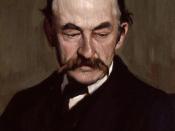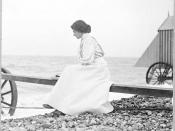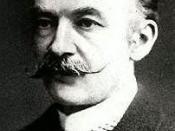Figurative language is used when a piece of writing or speech departs from its literal meaning in order to obtain a different meaning or a special effect. A poem can "unfold" its true meaning through images, imagery (a pattern of images), symbols and symbolism, and metaphor. The great poet, Thomas Hardy (1840-1928), mastered the craft of figurative language. Hardy's two poems, The Drummer Lodge and The Voice, are two examples of how a poet or writer can convey different ideas and aspects of life through figurative language. In each of these poems, Hardy depicts sadness due to death. In the Drummer Lodge it's an unfamiliar death by way of war to a young soldier. In the Voice it's a familiar person who has died and the protagonist, presumably Hardy, hopes it is his lost love.
In the Drummer Lodge, a young soldier dies in war. The war is heartrending and brutal.
The poem is written in a manner in which there is a sense of urgency. The boy is thrown into his burial sit "uncoffined-just a found." There was no time for a proper burial. He is thrown in, and not lowered like in a traditional funeral.
Also, the soldiers can't stand around and wait since they're on enemy territory. The reader knows it is not territory familiar to the buried soldier, Hodge, because Hardy uses words like "foreign constellations," "unknown plain" and "strange-eyed constellation." Hardy uses words, which are foreign to an English reader in order to convey that this is not familiar territory for anyone involved. Although the content is simplistic, the phrases that he uses are not. This makes the reader feel empathy for the young soldier's death and unfamiliarity with the situation and terrain.
2
Similarly, the Voice also has a saddened theme. The "voice"...



Nice go on
good work
nice style
but dont number ur essay
and keep going
6 out of 6 people found this comment useful.